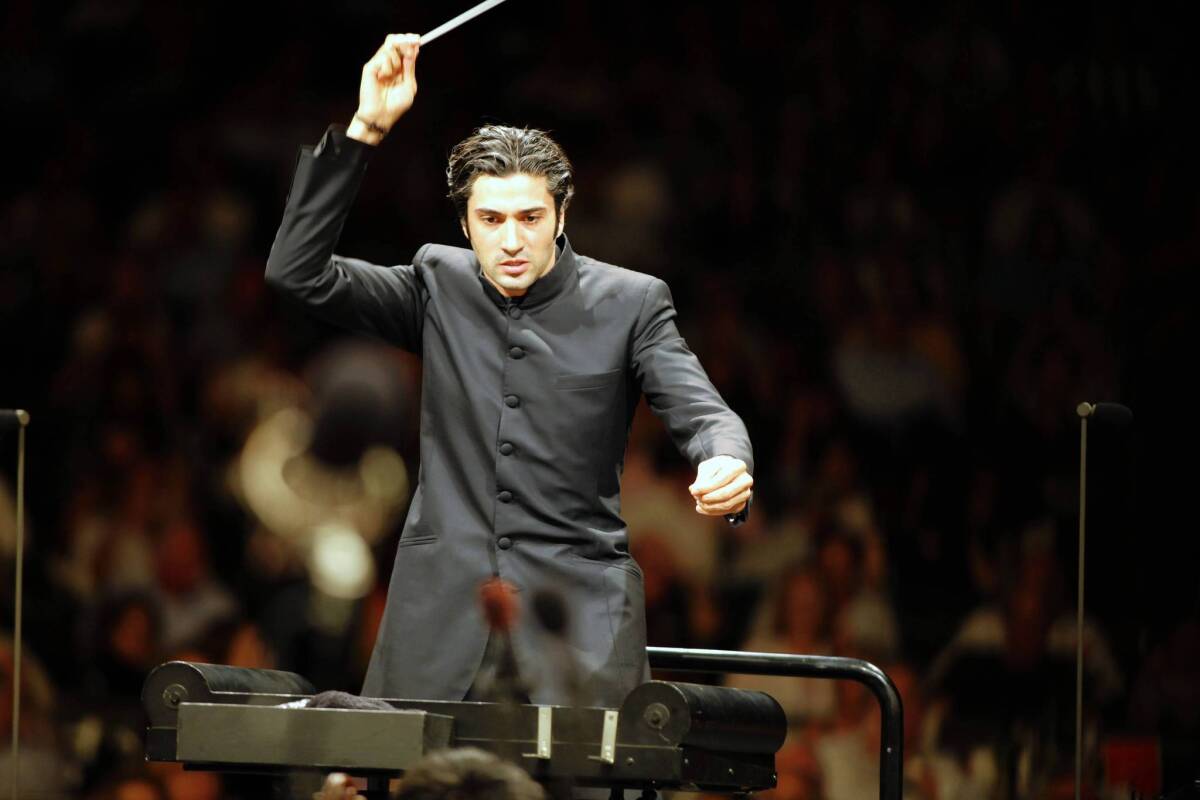Review: At the Bowl, Afkham and Lewis dance but don’t quite connect

The Hollywood Bowl is meant to be an exceedingly pleasant place to spend a mild Southland summer evening. The real truth is that this unseasonable summer has probably been a gift to the Bowl gift shop, at least for selling sweat shirts to the unprepared.
Thursday night, however, the gods of global warming were content. The temperature was warm enough for the Los Angeles Philharmonic players to remove their jackets but not sweltering for the audience. Brahms’ most lyrical symphony, his lullaby-laden second, was on the bill. So was Beethoven’s popular, hard-to-spoil, vigorous Third Piano Concerto.
A young German conductor, David Afkham — whom the L.A. Phil helped launch when it selected him as one of the first Dudamel Fellows in 2009 — made his Bowl debut. The much-admired, eloquent British pianist Paul Lewis was soloist.
TIMELINE: Summer’s must see concerts
With such elements, nothing was likely to go wrong. There was wonderful playing to be sampled. The Bowl’s new sound system was just what Lewis needed to bring out the subtleties of his finely graded dynamics; that aspect of his playing had gotten a little lost when the pianist made his Bowl debut in Beethoven’s Second Concerto four years ago. Afkham is expressive and photogenic, and the video crew knew just what to do.
The orchestra has an enviable health plan; Thursday was a bonus for the players. Afkham’s muscular Brahms offered them a healthful cardio workout. Lewis’ inward-striving Beethoven invited less perturbed yogic stretching.
But maybe everything was too perfect, this balmy, yin-yang night at the Bowl. I can’t seem to put my finger on what was missing. The performances didn’t feel complacent or uncommitted. Nor, though, were they quite as magical as the night called for.
CRITICS’ PICKS: What to do, see, hear and more this weekend
Catching up with Afkham was the main interest. Two seasons ago, while finishing up his stint as an L.A. Phil assistant conductor, he stepped in as a last-minute replacement for an indisposed guest conductor at Walt Disney Concert Hall and led an impressively fresh, exiting performance of Beethoven’s Fifth Symphony. Here was a conductor clearly on the rise. At 30, his career trajectory keeps climbing. His guest-conducting card with the major international orchestras is full. Next year, he becomes principal conductor of the Spanish National Orchestra.
Two weeks ago, Afkham led the Brahms Second at the Mostly Mozart Festival in New York to acclaim. At the Bowl, he added more Brahms, beginning the program with the “Tragic” Overture. In both scores, Afkham — whose arms limn a swooping big beat — animated rhythms by clipping the edges off phrases. The video screens revealed just how much he uses his eyes, popping them wide open when he wants atmosphere.
In this, he has much in common with a young Zubin Mehta, particularly by turning every measure into some kind of an event. Brahms’ symphonic sound is most characteristic in his use of the low instruments, and Afkham brought a kind of forceful flowing quality to the cellos and horns and deep winds for those Brahmsian long-lined melodies. The overture had weight. The symphony displayed a sense of purpose and a rousing finish.
PHOTOS: Arts and culture in pictures by The Times
But Brahms can be a gratifyingly messy composer whose great strength is to convey the resplendent richness of overgrowth. He thickens harmonies to the point of leafy, almost moldy lushness. There is a constant intertwining of lines, like roots and branches of a tree. Afkham doesn’t yet quite trust that. His determined Second was more a manicured garden.
The Beethoven concerto does require the kind of vigor and strength that Afkham neatly supplied. Lewis, however, was on different plane, making this yet another night at the Bowl when soloist and conductor weren’t entirely connecting.
Lewis nevertheless managed to cleverly dance his way through the concerto, weighing and balancing phrase against phrase. His first impulse is always a lyrical one, and the slow movement proved, not surprisingly, luminous. The Finale had spirit.
But Lewis is not the best pianist for the Bowl, even with audio and video enhancements to make his intimate approach transcend wide-open spaces. And there are just so many compromises that an interpretation can withstand before becoming, like this one, predictably faultless.
Still it was a very nice night.
More to Read
The biggest entertainment stories
Get our big stories about Hollywood, film, television, music, arts, culture and more right in your inbox as soon as they publish.
You may occasionally receive promotional content from the Los Angeles Times.











